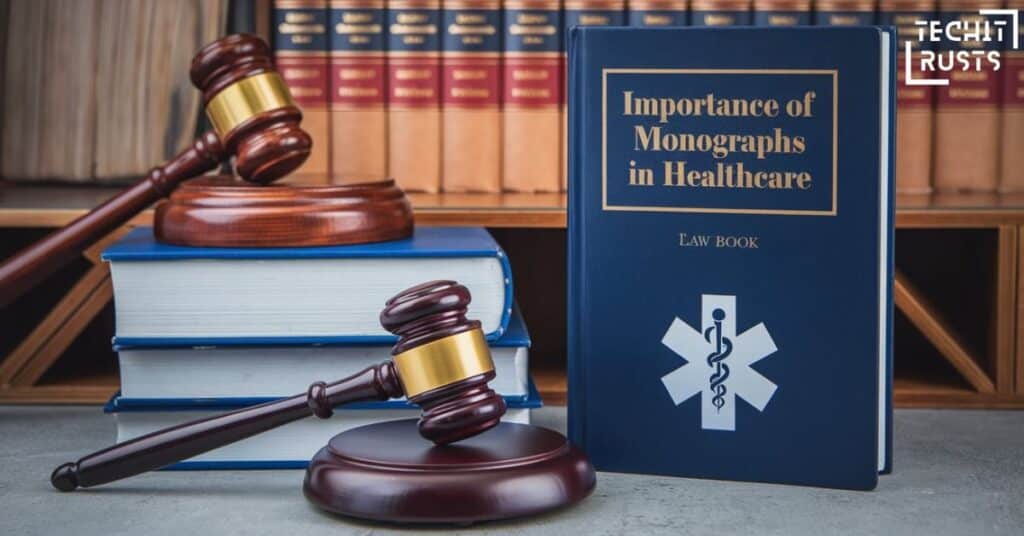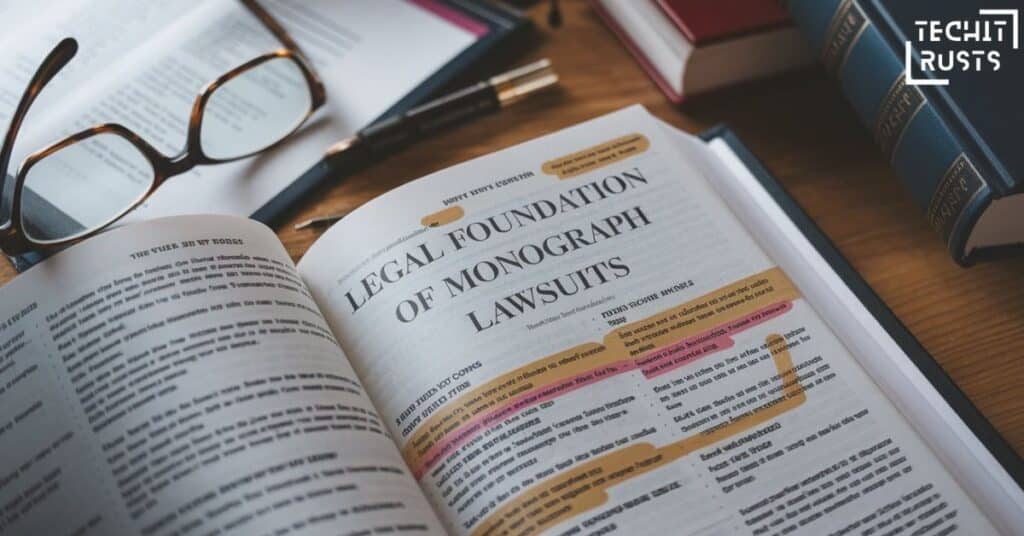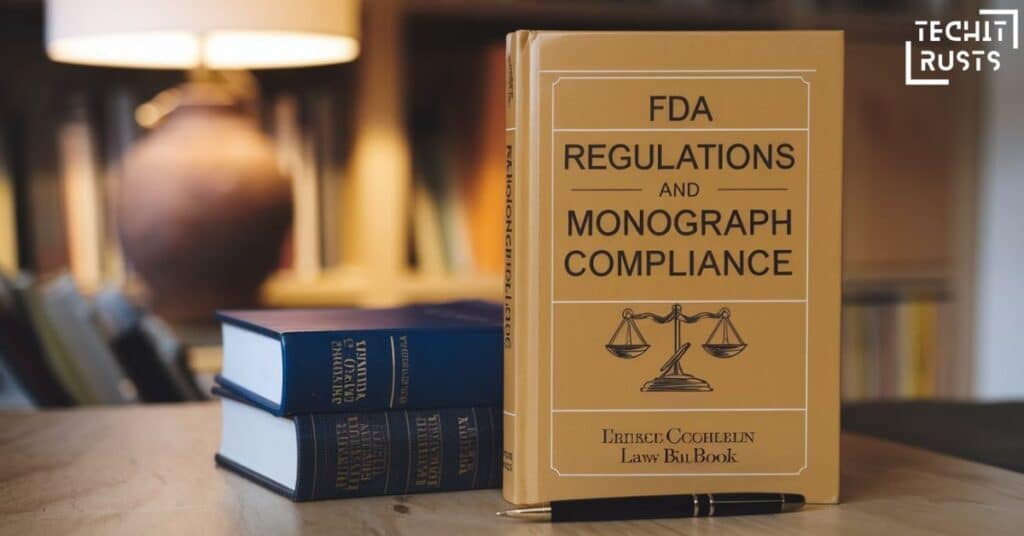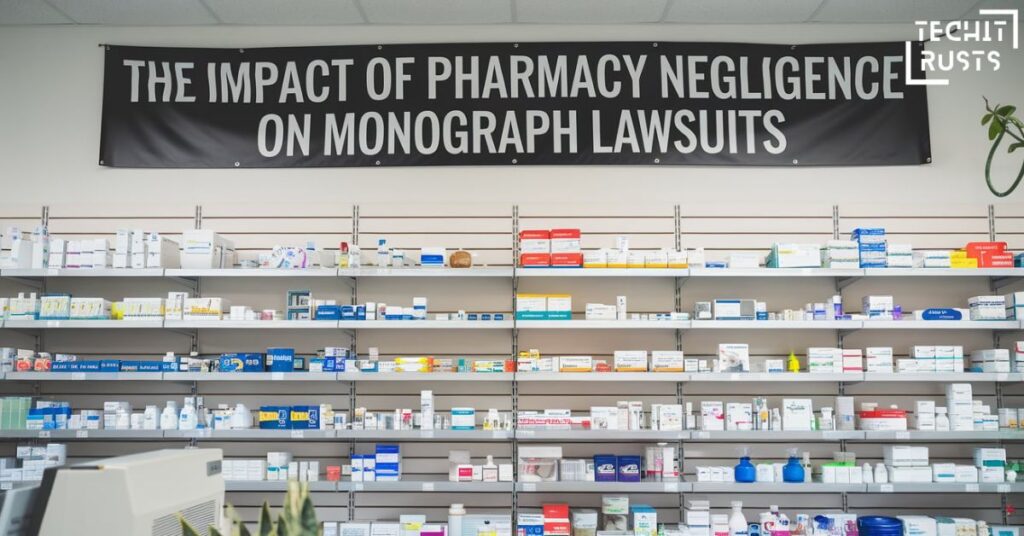Monographs are essential tools in the healthcare industry. These detailed, specialized documents provide in-depth information about medications, focusing on their uses, side effects, interactions, and warnings. Healthcare professionals depend on these resources to make informed decisions about treatments and to provide accurate information to patients.
However, when monographs fail to disclose critical data—especially risks associated with drug usage—legal actions can ensue. These are known as monograph lawsuits, a growing legal area in the healthcare and pharmaceutical sectors.
This article offers a detailed study of monograph lawsuits, discussing their causes, impact, and broader implications on healthcare and the pharmaceutical industry. We’ll cover key case studies, the role of pharmaceutical documentation, the importance of medical compliance, and how FDA regulations interact with monographs.
Additionally, we will look at how pharmacy negligence and medical software liability come into play when monographs omit essential information such as Black Box Warnings or details about drug side effects.
The Importance of Monographs in Healthcare
A monograph is a comprehensive written document that focuses on a single subject. In the healthcare sector, monographs often center on drugs or medications. They serve as authoritative resources, offering healthcare providers, pharmacists, and patients valuable medication information.

While their primary function is to provide accurate data about drugs, they also play a vital role in pharmacy protocols, healthcare regulations, and patient safety.
What Information Do Monographs Contain?
Healthcare monographs provide a wealth of information, including:
- Drug names (both generic and brand)
- Indications: the conditions or diseases the drug is approved to treat
- Dosage instructions: how much of the drug should be taken and how often
- Side effects: potential adverse effects that could arise from taking the medication
- Drug interactions: a list of other drugs or substances that might cause harmful effects when taken in combination
- Warnings and contraindications: specific conditions under which the drug should not be used, such as pregnancy or existing medical conditions
- Black Box Warnings: the strongest warning the FDA requires, typically reserved for drugs that pose significant risks
This information serves as a safeguard, helping to prevent medication errors, pharmacy negligence, and drug interactions that could harm patients.
Different Types of Monographs
Monographs exist in various forms, but in the healthcare sector, we focus primarily on:
- Drug monographs: Focus on the properties of a particular drug, including chemical composition, medical uses, and possible interactions.
- Pharmacy monographs: Documents used in pharmacies to provide patients with clear and concise information about medications.
- Academic research monographs: In-depth detailed studies that present findings from clinical trials or pharmaceutical research.
Each type of monograph contributes to the larger ecosystem of healthcare, ensuring that drugs are used safely and effectively.
The Legal Foundation of Monograph Lawsuits
Monograph lawsuits arise when pharmaceutical documentation fails to include important safety warnings or provides inaccurate information that leads to patient harm.

These lawsuits often involve a broad range of stakeholders, including drug manufacturers, pharmacies, healthcare providers, and healthcare IT firms responsible for producing or distributing monographs.
What Triggers a Monograph Lawsuit?
A monograph lawsuit can be triggered by several factors, most commonly:
- Omission of key information: This includes not mentioning critical side effects or drug interactions.
- Failure to update monographs: As new research emerges, monographs should be updated to reflect any changes in the safety profile of a drug.
- Misleading information: If a monograph downplays risks or provides misleading data, patients and healthcare providers might make unsafe decisions.
At the core of many monograph lawsuits is the failure to include a Black Box Warning. These are the strongest warnings the FDA issues, indicating that a drug carries significant risks of serious or life-threatening side effects.
Who Is Liable in a Monograph Lawsuit?
Liability in a monograph lawsuit often extends to several parties, including:
- Pharmaceutical companies: Responsible for producing accurate pharmaceutical documentation and updating monographs as new safety data becomes available.
- Pharmacies: Legally obligated to provide patients with up-to-date and accurate medication information.
- Healthcare providers: Physicians and pharmacists must ensure that they provide patients with all necessary warnings when prescribing or dispensing medication.
- Healthcare IT firms: If medical software used to generate monographs is faulty or fails to include essential warnings, the IT firm may face legal consequences for medical software liability.
Common Allegations in Monograph Lawsuits
In a typical monograph lawsuit, the following allegations may arise:
- Negligence: Failing to update or properly communicate drug risks.
- Breach of duty: Healthcare providers and pharmaceutical companies have a legal duty to protect patients from harm by providing complete information about a drug’s risks.
- Failure to warn: If a patient is harmed because they were not informed of a drug’s risks, they may claim that the pharmacy or manufacturer failed to warn them adequately.
Case Studies: Notable Monograph Lawsuits
To illustrate how monograph lawsuits play out in real-world scenarios, let’s examine two prominent case studies. These cases demonstrate the potential dangers of incomplete monographs and highlight the importance of medical compliance and FDA regulations.
Case Study 1: The Stevens-Johnson Syndrome (SJS) Monograph Omission
Stevens-Johnson Syndrome (SJS) is a severe skin condition that can be triggered by certain medications. In a landmark lawsuit, a patient who developed SJS after taking an anticonvulsant drug sued the drug manufacturer, pharmacy, and healthcare IT firm responsible for the monograph that omitted a Black Box Warning about the risk of SJS.
Key Facts:
- The drug: The anticonvulsant medication known to have a risk of causing SJS.
- The problem: The monograph provided by the pharmacy did not mention the severe risk of SJS, and the patient was unaware of the potential danger.
- Allegation: The pharmacy and IT firm were accused of pharmacy negligence and medical software liability for failing to include the Black Box Warning in the monograph.
Legal Outcome
The court found that both the pharmacy and the healthcare IT firm were liable for failing to provide the necessary warning. The pharmaceutical company also bore some responsibility, as they had not updated the monograph in a timely manner, even though the FDA had already mandated the Black Box Warning.
This case set a legal precedent, establishing that all parties involved in pharmaceutical documentation are responsible for ensuring that monographs contain complete and accurate medication information.
Case Study 2: Drug Interactions Leading to Fatal Overdose
In another high-profile lawsuit, a patient died after experiencing a fatal drug interaction between two medications that were both prescribed by different doctors. The pharmacy monograph for each drug failed to mention the interaction between the two, resulting in a fatal overdose.
Key Facts
- The drugs: Two medications with known dangerous interactions.
- The problem: Neither monograph contained information about the potential for the drugs to interact fatally when taken together.
- Allegation: The lawsuit accused the pharmacy and the medical field publication responsible for the monographs of gross negligence.
Legal Outcome
In this case, the pharmacy was found liable for pharmacy negligence, as they failed to review both prescriptions and check for dangerous drug interactions. The court ruled that pharmacies must ensure that pharmacy monographs accurately reflect the most current information regarding drug interactions, and failing to do so can result in severe legal and financial consequences.
Table: Key Differences Between Case Studies
| Aspect | SJS Case | Drug Interaction Case |
|---|---|---|
| Condition | Stevens-Johnson Syndrome (SJS) | Fatal drug interaction |
| Drug | Anticonvulsant | Multiple medications |
| Omission | Black Box Warning | Drug interaction warning |
| Parties Held Liable | Pharmacy, healthcare IT firm, pharmaceutical company | Pharmacy |
| Legal Outcome | Multi-million dollar settlement for the plaintiff | Liability for pharmacy negligence |
FDA Regulations and Monograph Compliance
In the United States, the Food and Drug Administration (FDA) plays a significant role in regulating drug information, including the data found in monographs.

While pharmacies are not required to follow FDA regulations as closely as drug manufacturers, they are expected to ensure that monographs contain accurate and up-to-date information. Failure to comply with FDA guidelines can result in regulatory actions and pharmacy legal cases.
What Are Black Box Warnings?
Black Box Warnings are the FDA’s most stringent warning for drugs that carry a significant risk of serious or life-threatening side effects. These warnings are named for the black border that surrounds the text in the monograph. All drugs that receive this warning must display it prominently in their labeling and monographs.
How Do FDA Regulations Affect Monographs?
FDA regulations require that all pharmaceutical documentation associated with a drug, including monographs, is accurate and
up-to-date. When the FDA mandates a new warning—such as a Black Box Warning—pharmaceutical companies and pharmacies are legally obligated to update their monographs accordingly.
In recent years, the FDA has also focused on drug interactions and medication errors, which are two of the most common causes of adverse events in healthcare. Ensuring that monographs accurately reflect the potential risks of drug combinations is critical for maintaining pharmaceutical industry compliance.
The Role of Healthcare IT Firms and Medical Software
In today’s digital age, many pharmacies and healthcare providers rely on medical software to generate monographs automatically. These healthcare IT firms design and maintain the systems that compile data from various sources, producing accurate and legally compliant monographs.

However, when software fails to include critical updates or omits information, the resulting medical software liability can be devastating.
How Medical Software Contributes to Monograph Lawsuits
There are several ways in which medical software may contribute to monograph lawsuits:
- Inaccurate data: If the software pulls outdated or incorrect data, the resulting monograph will reflect these inaccuracies.
- Failure to update: Software systems that do not automatically update when new FDA regulations are issued may result in monographs that lack essential warnings.
- Algorithmic errors: In some cases, the algorithms used by healthcare IT firms may fail to properly flag dangerous drug interactions or side effects, leading to medication errors.
The reliance on technology makes it critical that healthcare IT firms rigorously test and maintain their software to ensure it meets the highest standards of accuracy and medical compliance.
The Impact of Pharmacy Negligence on Monograph Lawsuits

Pharmacies play a key role in the distribution of monographs, and they have a legal duty to ensure that patients receive complete and accurate medication information. Pharmacy negligence occurs when pharmacies fail to meet this duty, leading to preventable harm.
Common Forms of Pharmacy Negligence
- Failure to review patient history: Pharmacies must review a patient’s medication history to avoid drug interactions. Neglecting to do so can lead to serious harm.
- Omitting warnings: If a pharmacy fails to provide a monograph with necessary warnings, they may be held liable for any resulting harm.
- Dispensing errors: Even when the monograph is accurate, errors in dispensing the wrong medication or dosage can lead to devastating consequences.
Preventing Monograph Lawsuits: Best Practices for Compliance
To prevent monograph lawsuits, healthcare providers, pharmacies, and pharmaceutical companies must follow stringent best practices. These practices help maintain pharmaceutical industry compliance and ensure patient safety.
Tips for Healthcare Providers
- Stay informed: Healthcare providers must keep up with the latest research and updates from the FDA, especially concerning Black Box Warnings and new drug interactions.
- Communicate clearly: Physicians and pharmacists must ensure that patients fully understand the risks associated with their medications.
- Use technology wisely: While medical software can streamline the process, healthcare providers should still manually review patient records and monographs to catch any potential errors.
Tips for Pharmacies
- Update monographs regularly: Pharmacies should ensure that their pharmacy monographs are updated in real-time as new data becomes available.
- Double-check for interactions: Pharmacists should double-check each patient’s prescription for potential drug interactions and ensure that these are reflected in the monograph.
- Provide clear documentation: Pharmacies should provide easy-to-understand monographs that include all necessary warnings, including Black Box Warnings.
Tips for Healthcare IT Firms
- Regularly test software: Healthcare IT firms must continuously test and update their systems to ensure that monographs are generated accurately and include all essential information.
- Monitor FDA guidelines: Software providers should closely monitor changes in FDA regulations and update their systems as needed to ensure full compliance.
Frequently Asked Questions
What is a monograph in the pharmaceutical industry?
A monograph is a detailed document that provides essential information about a specific drug, including its uses, dosage, side effects, warnings, and potential interactions with other medications. It is used by healthcare providers, pharmacists, and patients to understand the medication’s safety and efficacy.
What are common causes of monograph lawsuits?
Monograph lawsuits typically arise when a monograph is incomplete or inaccurate, leading to patient harm. Common causes include:
- Omitted warnings (such as FDA-mandated Black Box Warnings),
- Failure to update information about drug interactions,
- Incorrect dosage instructions, and
- Outdated safety data in the monograph.
Who can be held liable in a monograph lawsuit?
Several parties may be held liable in a monograph lawsuit, including:
- Pharmaceutical companies for providing incorrect or outdated information,
- Healthcare IT firms for software errors that generate inaccurate monographs,
- Pharmacies for distributing incorrect monographs or failing to provide the necessary warnings.
How can healthcare providers and pharmacies prevent monograph lawsuits?
To prevent monograph lawsuits, healthcare providers and pharmacies can:
- Ensure real-time updates of monograph data,
- Regularly review FDA guidelines and safety information,
- Check for drug interactions and other risks before prescribing or dispensing medications,
- Communicate clearly with patients regarding the risks and side effects.
What role does the FDA play in monograph lawsuits?
The FDA plays a critical role by regulating drug safety and requiring pharmaceutical companies to update monographs when new safety information becomes available. The FDA can issue new warnings, including Black Box Warnings, which must be reflected in the monographs. Failure to comply with these updates can result in lawsuits.
How does medical software contribute to monograph-related issues?
Medical software used by pharmacies and healthcare providers to generate monographs can contribute to issues when:
- Algorithms fail to detect dangerous drug interactions,
- Software is not updated with the latest FDA regulations,
- Inaccurate data is used to generate monographs, leading to errors in the provided information.
Conclusion
monograph lawsuits highlight the critical importance of accuracy and diligence in pharmaceutical documentation. These lawsuits serve as a reminder of the potential consequences that arise from omitted warnings, outdated data, or software errors in healthcare settings.
Ensuring that drug monographs are consistently updated with accurate and in-depth information can help prevent medication errors, protect patient safety, and reduce legal risks.
Moving forward, all stakeholders, including pharmaceutical companies, pharmacies, and healthcare IT firms, must prioritize compliance with FDA regulations and maintain high standards in drug documentation. By doing so, they not only safeguard patients but also contribute to a safer and more transparent healthcare industry.
>>>Read Also: Everything About The Capital One Bank Settlement 2024 Payout Date And What You Need To Know

Ashi is the site admin for “techitrusts.com” and specializes in writing within the journal category. If you need more detailed information about his background or work, feel free to ask!